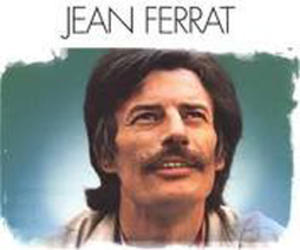Jean Ferrat and his visits to Cuba
- Submitted by: manso
- Editorial Articles
- 04 / 02 / 2011

By: Rafael Lam. It is one It is one year since the death of Jean Ferrat, considered the last of the great French singers along with Jacques Brel, Leo Ferré and Georges Brassens. His last visit to Cuba was in May 1967.
To learn more details of Ferrat’s trip to the island 44 years ago, I spoke to Julio Bidopia, general manager of Agencia Clave, who was responsible for the French singer’s engagement here.
"In 1967 I was International Relations director of the National Council of Culture. During that stage I visited Paris, and in a reception at the Cuban Embassy I suggested that Ferrat visit Cuba. There are photos of that first meeting and from there his tour through some of the country’s cities, hosted by the Cuban Institute for Friendship with the Peoples (ICAP)."
Bidopia recalls that Ferrat met for two hours in the Havana Libre Hotel with Bola de Nieve and some composers in the genre of filin (feeling), such as Portillo de la Luz, Rosendo Ruiz Quevedo and José Antonio Méndez.
"We didn’t sing for him," Portilla told me in his home, "we spoke about music. Bola was already very well known given his tours of France. We revealed our musical philosophy to him. It was a very friendly meeting, he was a sensitive artist, concerned about the problems of the music industry and political issues about which he was very critical and resolute."
For Ferrat, songs were a means of expression and through them, he shared his concerns, not commercially, but as a work of art.
"I believe that my songs make young people think, if that were not true, I wouldn’t sing. The essential thing is that is that everyone should contribute what they can within their fields of action. Singing is the means via which I tell people about the things that worry me; for example, in "Nuit et brouillard," I talk about the people who were deported to the concentration camps. A singer should be understood by everyone, without singing nonsense. Artists have to be complex and simple at the same time."
Ferrat’s debut in Havana was on May 24, 1967 at the Amadeo Roldán Theater. In the capital, a lot of people wanted to see him in person. That was the time in Havana of the popularity of the Mozambique beat, Los Zafiros quartet, and the Changüí-Shake from Formell and the Revé Orchestra.
Ferrat, aged 37, with his huge mustache, arrived accompanied by his wife Christine Sevré and the photographer Jean Tessier of the French Communist Party newspaper L’Humanité. His musicians were Guy Boulanger on piano; Marc Larrange on drums; Roland Evans, acoustic bass; and sound engineer J.C. Mouling.
The "chansonier" performed around 20 songs covering different issues: human beings and their struggles, their loves. Some of the songs were banned in France.
At the Roldán Theater, the audience enjoyed "Aimer à perdre la raison," "Camarade," "La Montagne," "Nuit et brouillard" and, among his most frequently heard hits, "Les yeux d’Elsa," a song based on the words of Louis Aragón, a poet whom he admired. He ended every song with the audience in the palm of his hand.
Ferrat demonstrated his thesis that he did not sing to pass the time, but to fill time. His best received songs, weighted with popular sentiment interspersed with harsh condemnations, included "La Montagne," which narrates the preoccupations of a man who has to emigrate far from his country in order to earn a living; "La Liberté est en Voyage," an exposé of the seeming freedom of the capitalist world; "En groupe en ligue en procession," signaled his repulsion over colonialist wars and in "Potemkin," (lyrics by Georges Coulonges with music by Ferrat) he shares his conviction that rebellion against injustice is always present.
Ferrat toured Cuba twice, the second time was for the 1st International Festival of Popular Song in Varadero.
In 1972 the singer retired from the musical scene, disappointed by the political problems of his era, as well as being highly critical of the multinational music industry and its manipulation of recordings which, in his opinion, was endangering creative autonomy. On March 13, 2010, aged 79, he bade the world farewell.
The Parisian public described Jean Ferrat as "an icon of protest song."
Comments